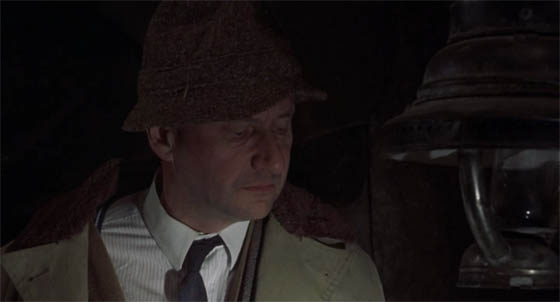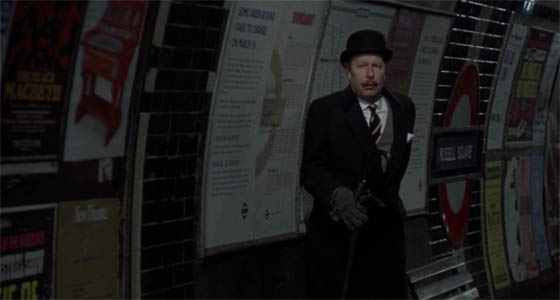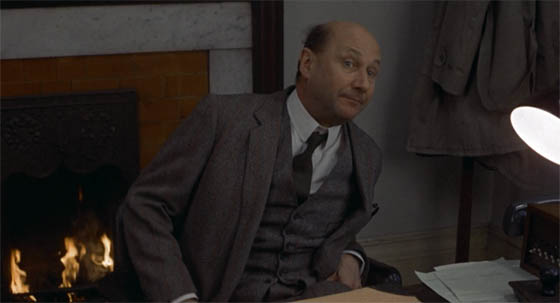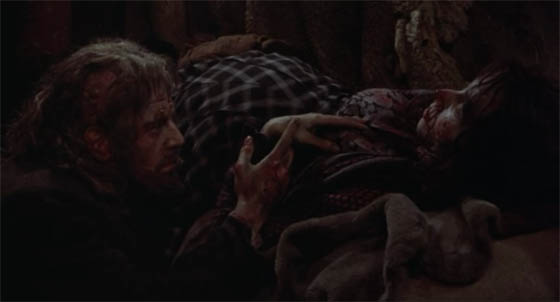 There’s a certain subgenre of horror film that takes the form of a police procedural: understated, reserved, doggedly sticking to the facts, sorting through suspects, and chasing the clues until they lead to stranger and stranger conclusions, with either a monster or a madman waiting at the end. Many of these unfold in American urban centers (see: Larry Cohen’s God Told Me To and Q: The Winged Serpent), but just as many, it seems, take place in London. The British have always excelled at this kind of thing; last week I wrote about the British film The Quatermass Xperiment (1955), which took the same approach to a science fiction tale of alien invasion, and stands with the best SF films of the 50’s as a result. Raw Meat (1973), aka Death Line, an AIP film with an American director and a British setting, commits itself so entirely to the police procedural/journalistic narrative device that it almost forgets to be a horror film. Never mind the fact that it’s about grisly murders committed by inbred cannibals in the London Underground.
There’s a certain subgenre of horror film that takes the form of a police procedural: understated, reserved, doggedly sticking to the facts, sorting through suspects, and chasing the clues until they lead to stranger and stranger conclusions, with either a monster or a madman waiting at the end. Many of these unfold in American urban centers (see: Larry Cohen’s God Told Me To and Q: The Winged Serpent), but just as many, it seems, take place in London. The British have always excelled at this kind of thing; last week I wrote about the British film The Quatermass Xperiment (1955), which took the same approach to a science fiction tale of alien invasion, and stands with the best SF films of the 50’s as a result. Raw Meat (1973), aka Death Line, an AIP film with an American director and a British setting, commits itself so entirely to the police procedural/journalistic narrative device that it almost forgets to be a horror film. Never mind the fact that it’s about grisly murders committed by inbred cannibals in the London Underground.

The first victim (James Cossins) is about to be claimed by a cannibal of the Underground.
The film opens with one of the most stylish opening credits sequences of the early 70’s: the camera shifts in and out of focus while tracking a well-to-do gentleman who’s browsing through sex shops and strip clubs as casually as a teenager at the mall on Friday night, as funky theme music by Will Malone grinds hot and sweaty on the soundtrack. As the credits end, he finds himself in the Underground, and swiftly executed by something unseen. Later, a young American and his British girlfriend come across the victim’s body sprawled on the steep steps of the tunnels. He wants to pass the scene by, assuming it’s nothing but an unconscious drunk; but she demonstrates some inconvenient empathy. When they determine he’s dead, they search his wallet and find out he’s no less than an O.B.E. By the time they can summon a security guard, the body is gone. Still, the very specific identification they can give of the corpse’s identity calls the attention of the police, and so the case falls into the lap of Inspector Calhoun. The inspector, as played by Donald Pleasence of The Great Escape (1963) and You Only Live Twice (1967), can’t summon enthusiasm past a barely coherent mumble, and maintains this disposition for much of the film. Far more interested is Detective Sergeant Rogers (Norman Rossington), though Calhoun merely demands the man keep him constantly supplied with tea. (He berates his secretary, “Tea bags? You’ve been using tea bags?” To which she responds, “They’re standard issue, sir.”) Calhoun shows little patience with the young couple – he sees them as hippies – and makes scant progress in the search for the missing O.B.E. Christopher Lee has a brief cameo as a member of MI-5, which begins to take an interest in the case, and he spars briefly with Pleasence before disappearing from the film; one gathers the intent was merely to place “and Christopher Lee” in the opening credits. Which is fine by me; this is Christopher Lee.

Donald Pleasence, as Inspector Calhoun, demands more tea.
When it comes to plot, there isn’t much to speak of. Some brief exposition-dump about tunnelers trapped long, long ago while working on an expansion of the Underground is obviously very important – especially when it’s speculated that some of those workers, never recovered, may have survived – but Inspector Calhoun’s investigation never really leads him where it ought to; only when the young woman, Patricia (Sharon Gurney), returns to the scene of the crime and is kidnapped does the story finally begin moving forward. But it’s not the plot which makes Raw Meat special. It’s the strangely muted delivery of its potent material: after that groovy opening tune, music is largely absent from the film, whose soundtrack relies instead upon Pleasence’s irritated mumblings and demands for more tea. From these dry-as-toast bureaucratic scenes we’re shaken with sudden bursts of violence, such as the killing of two maintenance workers in the tunnels, one of whom is impaled by a broom handle. And director Gary Sherman frequently contrasts above-ground banality with the cannibals living underground, wandering through makeshift butcher shops decorated with human body parts, feasting on rats and “raw meat.” They even receive some pathos: when “the woman” (June Turner) dies pregnant, “the man” (Hugh Armstrong) falls into such a grief and rage that he’s driven to take more excursions into the occupied tunnels of the Underground, to claim more victims, and, possibly, a new wife. This approach is reminiscent, to a modern viewer, of the X-Files episode “Home,” which also dealt with cannibals and inbreeding, but didn’t shrink from humanizing its killers.

The cannibal (Hugh Armstrong) mourns his wife (June Turner).
And yet, it’s difficult to wholly recommend Raw Meat: it’s an interesting picture, a significant genre film in many ways, but a flawed one. When you realize, after the film has concluded, that all the time spent on the police investigation was wasted – that there is no genuine clues-to-solution progression – you feel a little cheated. Much of the film is merely padding, a semblance of a narrative which exists either to frame some gruesome cannibal horror, or to highlight a rare starring performance by the prolific character actor Donald Pleasence. To that latter end, I can hardly complain (though if that’s all you want, go watch Cul-de-sac instead). And there isn’t enough horror, either. By the time we arrive at the inevitable Underground confrontation with the killer, it’s too little, too late. Regardless, Raw Meat casts a significant shadow on horror films that followed in the 70’s and 80’s, particularly An American Werewolf in London – which made the Underground spooky again, and to bigger rewards. In the glut of low-budget drive-in movies of the early 70’s, it stands apart for refusing to be cheap and exploitative. It’s a serious film. With an awful lot of steaming-hot tea.









